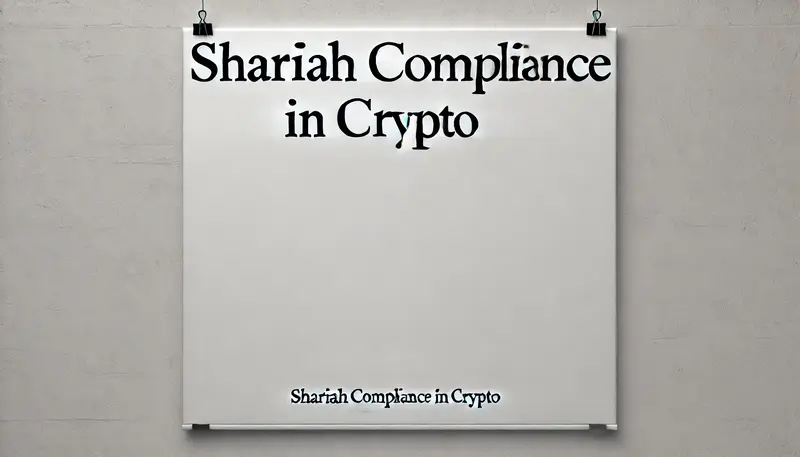Halal-conscious investors face new opportunities and challenges with blockchain and cryptocurrency. At Halal DeFi, we aim to offer Shariah-compliant investments by focusing on transparency and core Islamic principles, rather than traditional certification. Here’s why we’ve chosen this path and how we ensure Shariah compliance.
The Need for a New Approach in Digital Assets
Blockchain and cryptocurrency have transformed financial markets, offering potential for growth and innovation. Yet, the fast evolution of these assets poses challenges to traditional Shariah compliance frameworks. Islamic finance standards, developed over decades for stocks and mutual funds, don’t fully address the nuances of blockchain.
Historically, Muslims have missed opportunities due to lengthy debates over what’s halal. In the tech boom of the early 2000s, for example, many refrained from investing in early giants like Amazon and Google because of inconclusive discussions. Today, similar debates around digital assets like Ethereum risk repeating this history. At Halal DeFi, we want to ensure Muslim investors don’t miss out again by providing a way to participate responsibly in the blockchain space.
A Principles-Based Approach: The Case for Original Permissibility
An important part of our philosophy at Halal DeFi is rooted in a foundational principle in Islamic jurisprudence: al-asl fi al-ashya' al-ibaha—the default rule concerning things is permissibility. This means that everything is considered halal (permissible) unless there is clear evidence that declares it haram (forbidden).
The Quran itself supports this view, as stated in Surah Al-Baqarah (2:29): "He is the One Who created for you all that is in the earth." This verse suggests that the natural state of things is permissibility, emphasizing that it is up to those who claim something is forbidden to provide evidence. A Hadith from Prophet Muhammad (peace be upon him) echoes this idea: "What Allah has made halal in His Book is halal, what He has made haram is haram, and what He has remained silent about is allowed as a favor." (Al-Tirmidhi).
For newer issues or those not explicitly mentioned in the primary texts—like many aspects of blockchain and digital finance—scholars often use qiyas (analogical reasoning) and ijtihad (independent reasoning) to derive rulings. This explains why there can be differing opinions among scholars, especially with contemporary challenges.
Why Halal DeFi Doesn’t Have a Traditional Shariah Board
A common question we face is why we don’t have a formal Shariah board or certification from bodies like the Accounting and Auditing Organization for Islamic Financial Institutions (AAOIFI). Here’s our reasoning:
- Agility in a Fast-Moving Market: Blockchain requires quick decision-making. Traditional Shariah boards often involve lengthy deliberations, which can slow down opportunities. Our model allows us to adapt swiftly while staying true to our values.
- Guidance from Trusted Scholars: We consult a network of respected Islamic finance advisors who offer guidance on complex issues, ensuring we uphold Shariah principles. This lets us access specialized insights without the slowdowns of larger advisory boards.
- Rigorous Research and Due Diligence: Our team thoroughly researches each investment to ensure it avoids riba (interest) and excessive uncertainty (gharar). We also reference credible sources like Islamic Finance Guru to ensure our choices align with Islamic teachings.
Rethinking Certification Standards
For many, certification from AAOIFI or similar entities is considered a mark of Shariah compliance. While we respect these bodies, it’s important to understand the limitations of their approach, especially when applied to the evolving landscape of digital assets:
- Interpretation Over Scripture: Standards like the 33% debt threshold are based on scholars’ interpretations, not direct evidence from Islamic texts. Some scholars, including those from the Council of Senior Scholars in Saudi Arabia, have criticized such thresholds as arbitrary. They argue that a company should be judged on whether its core business is halal and free from interest-based financing.
- Challenges with Evolving Assets: AAOIFI’s frameworks were created for conventional assets, not digital ones. Blockchain requires new guidelines that consider the unique nature of these investments. As the space evolves, there’s a need for standards that are more relevant to new financial tools.
- Burden of Proof in Islamic Law: Islamic jurisprudence also teaches that al-asl bara’ah al-dhimmah—the presumption of innocence—applies when determining what is haram. In other words, the burden of proof lies with those who claim something is forbidden. As narrated by the Prophet (peace be upon him): "The burden of proof is upon the claimant, and the oath is upon the one who denies." (Al-Bukhari and Muslim). This principle guides our approach, as we focus on the clear principles in the Quran and Hadith while exploring new opportunities in digital finance.
Our Approach to Shariah Compliance
While we may not have formal certification, our commitment to Islamic principles is strong. Here’s how we ensure our investments remain Shariah-compliant:
- Complete Transparency on the Blockchain: Every transaction and investment is recorded on the blockchain, providing full transparency. Investors can verify our activities directly, giving them confidence in the ethical nature of our investments.
- Public Investment Theses: For each project we support, we publish an investment thesis that outlines why we believe it aligns with Islamic principles. This transparency allows investors to understand our rationale and make informed decisions.
- Empowering Investor Choice: Unlike traditional funds with long lock-up periods, our $HDF tokens offer liquidity, allowing investors to exit if they disagree with our approach. This flexibility aligns with the Islamic principles of transparency and mutual consent in trade.
Addressing Concerns with a Principles-Driven Perspective
Our approach may not align with everyone’s expectations, but we believe it’s important to return to the essence of Islamic finance: ethical conduct, avoiding interest, and transparency. While standards like the 33% rule are widely used, they lack a direct basis in Islamic texts. A respected view from the community sums it up well:
"The 33% rule has no basis in the Shariah... A group of ‘shaykhs’ made it up. The Council of Senior Scholars in Saudi says investments are permissible if they avoid interest and are otherwise halal. We should base our religion on evidence, not people’s opinions."
This perspective emphasizes that as long as an investment’s financing avoids riba and its business is halal, it should be considered permissible. In the evolving blockchain sector, we believe this interpretation is more practical and true to the spirit of Islamic teachings.
The Role of Blockchain in Supporting Transparency and Accountability
One of the most powerful aspects of blockchain is its ability to provide transparency. All of our investment activities are recorded on an immutable public ledger, allowing investors to monitor their investments in real-time. This level of openness is not just a feature—it’s a fundamental part of our values at Halal DeFi.
If an investor disagrees with our investment choices, they can easily access the information needed to make their own decisions. We believe this transparency is in harmony with Islamic teachings and allows us to offer an ethical investment platform without relying on external certifications.
Conclusion: Our Beliefs, Our Intentions, and Allah Knows Best
At Halal DeFi, we strive to provide a path for halal-conscious investors to explore the future of finance without compromising their values. We understand that some may still prefer traditional certification, and we respect those views. Our approach is built on transparency, ethical intent, and a deep commitment to our community.
Ultimately, we acknowledge that our understanding is limited, and we are always open to learning and improving. As the Quran says: “وَفَوْقَ كُلِّ ذِي عِلْمٍ عَلِيمٌ” ("And above every person of knowledge is one who knows more." - Quran 12:76). We remain guided by our principles and seek to do what is best, with humility and sincerity. Allah knows best.


